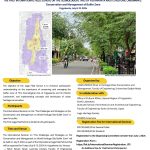Abstract:
Cultural heritage possesses important potentials for developing cultural resilient urban and regional transformations that enable the local communities to overcome various kinds of adversity. There is a lack of understanding by policy makers of how cultural heritage can cause resilience to emerge.
The objective of this article is to describe how cultural resilience is able to emerge in a living settlement. The study used a descriptive- case study design that covered the traditional living settlements of Poerwodadi in Suriname inhabited by a Javanese community.
By analyzing several significant development stages of Poerwodadi the study was able to discover the various events that led to the self-organization of intangible and tangible cultural structures that enabled a resilient community to exist. The various stages in gaining resilience has adjusted their behavior and caused to developed settlement in order to cope with the demands of the environment.
Author : Dr. Ir. Laretna T. Adishakti, M. Arch.



